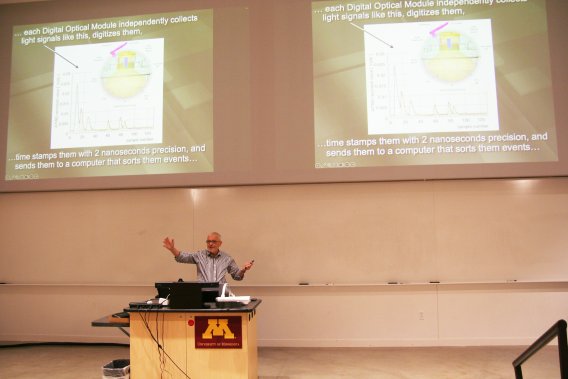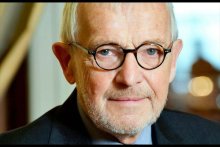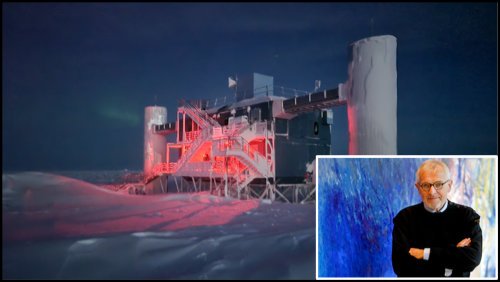2023 Misel Family Lecture
ICECUBE: Opening a Neutrino Window on the Universe from the South Pole
Professor Francis Halzen
Vilas and Gregory Breit Distinguished Professor
University of Wisconsin-Madison
Wednesday, September 13, 2023 at 7:00 p.m.
McNamara Alumni Center, Memorial Hall
Abstract: The IceCube project at the South Pole melted 86 holes 2.5 kilometer deep in the Antarctic icecap to construct an enormous astronomical observatory. The experiment discovered a flux of neutrinos from deep space with energies more than a million times those of neutrinos produced at accelerator laboratories. These cosmic neutrinos are created in some of the most violent processes in the universe since the Big Bang and originate in the cosmic particle accelerators that are still enigmatic sources of cosmic rays. This lecture will discuss the IceCube neutrino telescope and the discovery of high-energy neutrinos of cosmic origin. It will highlight the recent discovery that high-energy neutrinos—and cosmic rays—originate in sources powered by rotating supermassive black holes.
Couldn't make it to the lecture? Stream the lecture on YouTube.
Physics and Astronomy Colloquium
IceCube: High-Energy Cosmic Neutrinos and their First Sources
Thursday, September 14, 2023 at 3:35 p.m.

Abstract: Below the geographic South Pole, the IceCube project has transformed one cubic kilometer of natural Antarctic ice into a neutrino detector. IceCube detects more than 100,000 neutrinos per year in the GeV to 10 PeV energy range. From those, we have isolated a flux of high-energy neutrinos originating beyond our Galaxy, with an energy flux that is comparable to that of the extragalactic high-energy photon flux observed by the NASA Fermi satellite. With a decade of data, we have identified their first sources, which point to the obscured dense cores associated with the supermassive black holes of some active galaxies as the origin of high-energy neutrinos (and cosmic rays!).

About the Speaker
Born in Belgium, Halzen received his Master’s and PhD degrees from the University of Louvain, Belgium, and has been on the physics faculty at UW–Madison since 1972; in 2021, Halzen was named a Vilas Research Professor, one of the university’s most prestigious honors. He has been a fellow of the American Physical Society since 1994, and is the recipient of numerous awards, including the 2014 Smithsonian American Ingenuity Award, the 2015 Balzan Prize, a 2018 Bruno Pontecorvo Prize, the 2019 IUPAP Yodh Prize, the 2021 Bruno Rossi Prize, the 2021 Homi Bhabha Award, and honorary doctorates at several universities.
Halzen is the Principal Investigator of IceCube, a cubic-kilometer neutrino telescope buried in the Antarctic ice at the South Pole. IceCube’s first observations of high-energy cosmic neutrinos garnered the 2013 Physics World Breakthrough of the Year Award. In September 2017, IceCube detected a high-energy neutrino from the direction of a blazar called TXS 0506+056. This was the first-ever evidence of a source of high-energy cosmic rays, whose origins have been notoriously difficult to pinpoint since they were discovered over one hundred years ago.
Please register through the UMN Events Calendar (registration is encouraged but not required).
Read more about Professor Halzen on his University of Wisconsin webpage.
